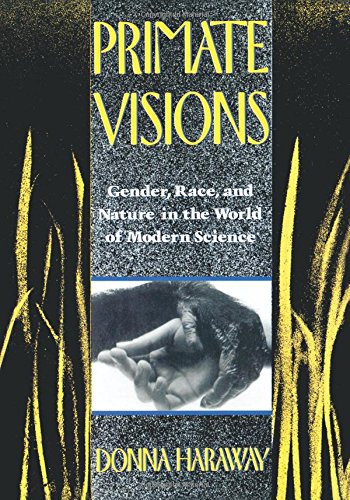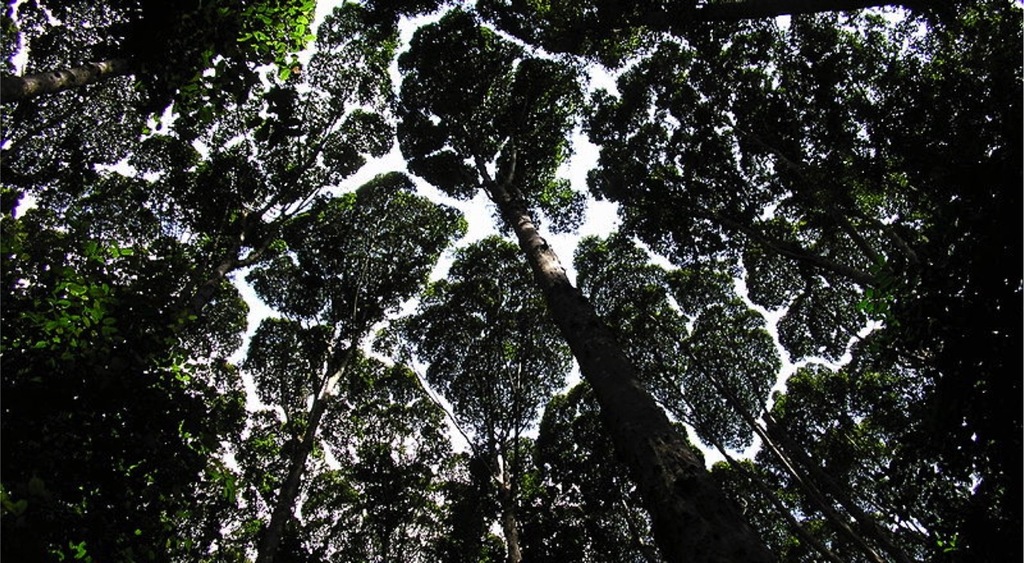Donna Haraway: Primate Visions: Gender, Race, and Nature in the World of Modern Science (1989)
Filed under book | Tags: · animal, biology, capitalism, family, feminism, gender, history of science, human, man, monkey, nature, primatology, race, science, sex, sexuality, technology, theory, women

“Haraway’s discussions of how scientists have perceived the sexual nature of female primates opens a new chapter in feminist theory, raising unsettling questions about models of the family and of heterosexuality in primate research.”
This “large book may be read from start to finish as a chronological and thematic survey of twentieth-century primatology. … But each chapter is simultaneously history of science, cultural studies, feminist exploration, and engaged intervention into the constitutions of love and knowledge in the disciplined crafting of the Primate Order. … My placing this account of primatology within SF–the narratives of speculative fiction and scientific fact–is an invitation for the readers of Primate Visions–historians, culture critics, feminists, anthropologists, biologists, anti-racists, and nature lovers–to remap the borderlands between nature and culture.” (from the Introduction)
Publisher Routledge, 1989
ISBN 0415902940, 9780415902946
ix+486 pages
Reviews: George E. Marcus (Science 1990), Alison Jolly and Margaretta Jolly (New Scientist 1990), Robin Dunbar (NY Times 1990), Louise Krasniewicz and Michael Blitz (Discourse 1990), Anne Fausto-Sterling (J Hist Biology 1990), Susan Cachel (Am J Primatology 1990), Meredith F. Small (Am J Physical Anthropology 1990), Sarah Franklin (J Hist Sexuality 1990), Matt Cartmill (Int J Primatology 1991), M. Lynn Byrd (H-Ideas 2001).
PDF (48 MB, added on 2021-3-10)
EPUB (3 MB)
Annie van den Oever (ed.): Ostrannenie: On ‘Strangeness’ and the Moving Image: The History, Reception, and Relevance of a Concept (2010)
Filed under book | Tags: · avant-garde, cinema, defamiliarisation, estrangement, film, film theory, formalism, narrative, ostranenie, perception, representation, technique, theory

“Ostrannenie (‘making it strange’) has become one of the central concepts of modern artistic practice, ranging over movements including Dada, postmodernism, epic theatre, and science fiction, as well as our response to arts. Coined by the ‘Russian Formalist’ Viktor Shklovsky in 1917, ostrannenie has come to resonate deeply in Film Studies, where it entered into dialogue with the Brechtian concept of Verfremdung, the Freudian concept of the uncanny and Derrida’s concept of différance. Striking, provocative and incisive, the essays of the distinguished film scholars in this volume recall the range and depth of a concept that since 1917 changed the trajectory of theoretical inquiry. European Film Studies ‘The Key Debates is a new film series from Amsterdam University Press edited by Annie van den Oever (the founding editor), Ian Christie and Dominique Chateau. The editors’ ambition is to uncover and track the process of appropriation of critical terms in film theory in order to give the European film heritage the attention it deserves. With contributions from Ian Christie, Yuri Tsivian, Dominique Chateau, Frank Kessler, Laurent Jullier, Miklós Kiss, Annie van den Oever, Emile Poppe, László Tarnay, Barend van Heusden, András Bálint Kovács, and Laura Mulvey, this important study is a wonderful piece of imaginative yet rigorous scholarship.”
Publisher Amsterdam University Press, Amsterdam, 2010
The Key Debates series, 1
Creative Commons BY-NC-ND 3.0 License
ISBN 9089640797, 9789089640796
278 pages
Reviews: Simon Spiegel (Projections, 2011), Lara Cox (Film-Philosophy, 2011), Sanna Peden (Studies in European Cinema, 2015).
Comment (0)Cultural Anthropology: Lexicon for an Anthropocene Yet Unseen (2016–2017)
Filed under journal | Tags: · anthropocene, anthropology, environment, theory

“The idea of an Anthropocene has spread with astonishing speed, dislodging familiar terms like nature and environment from their customary preeminence as signs of the world beyond ourselves. These developments pose a peculiar challenge for those of us in anthropology. To be sure, everyone suddenly seems to share our concern for that singular creature, anthropos. Yet, the Anthropocene is a gift armed with teeth, with a hau of demands and reciprocal tethers that have left many anthropologists rightly cautious about embracing its tale of an overwhelming human agency. What would it take, we wonder, to see this time and its configurations, agencies, and effects otherwise? With this lexicon we hope to develop a resource that is helpful for this task.
This Theorizing the Contemporary series is meant to confront the challenge of vision and sensibility, of finding new ways of conceiving, engaging, and expressing the felt impasses of the present. It first sprung to life as a “pop-up” panel at the 2015 annual meeting of the American Anthropological Association, with contributions emerging on the fly amid the tumult of an annual academic carnival.”
Terms: Address, Carbon, Care, Cloud, Cosmos, Distribution, Dream, Earths, Ecopolitics, Environing, Expenditure, Flatulence, Generation, Gluten, Heat, Hyposubjects, Leviathans, Melt, Models, Nature, Nemesis, Petroleum, Photosynthesis, Plastic, Power, Predation, Preparedness, Probiotic, Relationships, Ruin, Shit, Species, Stability, Steps, Sustainability, Timely, Vulnerability, Wildness, Zoonosis. (list updated on 2016-10-6)
Edited by Cymene Howe and Anand Pandian
Publisher Society for Cultural Anthropology, 2016
Theorizing the Contemporary series
ISSN 1548-1360
HTML (updated on 2019-6-29)
Book edition (2020, added on 2020-12-1)

